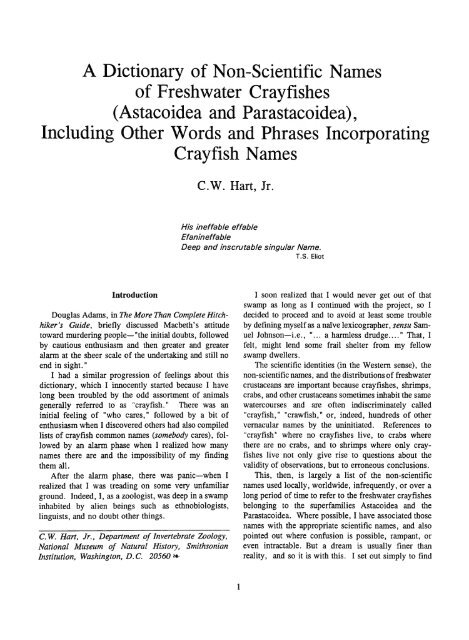A Dictionary of Non-Scientific Names of Freshwater Crayfishes ...
A Dictionary of Non-Scientific Names of Freshwater Crayfishes ...
A Dictionary of Non-Scientific Names of Freshwater Crayfishes ...
You also want an ePaper? Increase the reach of your titles
YUMPU automatically turns print PDFs into web optimized ePapers that Google loves.
A <strong>Dictionary</strong> <strong>of</strong> <strong>Non</strong>-<strong>Scientific</strong> <strong>Names</strong><br />
<strong>of</strong> <strong>Freshwater</strong> <strong>Crayfishes</strong><br />
(Astacoidea and Parastacoidea),<br />
Including Other Words and Phrases Incorporating<br />
Crayfish <strong>Names</strong><br />
Introduction<br />
Douglas Adams, in The More Than Complete Hitchhiker's<br />
Guide, briefly discussed Macbeth's attitude<br />
toward murdering people—"the initial doubts, followed<br />
by cautious enthusiasm and then greater and greater<br />
alarm at the sheer scale <strong>of</strong> the undertaking and still no<br />
end in sight."<br />
I had a similar progression <strong>of</strong> feelings about this<br />
dictionary, which I innocently started because I have<br />
long been troubled by the odd assortment <strong>of</strong> animals<br />
generally referred to as "crayfish." There was an<br />
initial feeling <strong>of</strong> "who cares," followed by a bit <strong>of</strong><br />
enthusiasm when I discovered others had also compiled<br />
lists <strong>of</strong> crayfish common names (somebody cares), followed<br />
by an alarm phase when I realized how many<br />
names there are and the impossibility <strong>of</strong> my finding<br />
them all.<br />
After the alarm phase, there was panic—when I<br />
realized that I was treading on some very unfamiliar<br />
ground. Indeed, I, as a zoologist, was deep in a swamp<br />
inhabited by alien beings such as ethnobiologists,<br />
linguists, and no doubt other things.<br />
C.W. Hart, Jr., Department <strong>of</strong> Invertebrate Zoology,<br />
National Museum <strong>of</strong> Natural History, Smithsonian<br />
Institution, Washington, D. C. 20560 *-<br />
C.W. Hart, Jr.<br />
His ineffable effable<br />
Efanineffable<br />
Deep and inscrutable singular Name.<br />
T.S. Eliot<br />
I soon realized that I would never get out <strong>of</strong> that<br />
swamp as long as I continued with the project, so I<br />
decided to proceed and to avoid at least some trouble<br />
by defining myself as a naive lexicographer, sensu Samuel<br />
Johnson—i.e., "... a harmless drudge...." That, I<br />
felt, might lend some frail shelter from my fellow<br />
swamp dwellers.<br />
The scientific identities (in the Western sense), the<br />
non-scientific names, and the distributions <strong>of</strong> freshwater<br />
crustaceans are important because crayfishes, shrimps,<br />
crabs, and other crustaceans sometimes inhabit the same<br />
watercourses and are <strong>of</strong>ten indiscriminately called<br />
"crayfish," "crawfish," or, indeed, hundreds <strong>of</strong> other<br />
vernacular names by the uninitiated. References to<br />
"crayfish" where no crayfishes live, to crabs where<br />
there are no crabs, and to shrimps where only crayfishes<br />
live not only give rise to questions about the<br />
validity <strong>of</strong> observations, but to erroneous conclusions.<br />
This, then, is largely a list <strong>of</strong> the non-scientific<br />
names used locally, worldwide, infrequently, or over a<br />
long period <strong>of</strong> time to refer to the freshwater crayfishes<br />
belonging to the superfamilies Astacoidea and the<br />
Parastacoidea. Where possible, I have associated those<br />
names with the appropriate scientific names, and also<br />
pointed out where confusion is possible, rampant, or<br />
even intractable. But a dream is usually finer than<br />
reality, and so it is with this. I set out simply to find
















